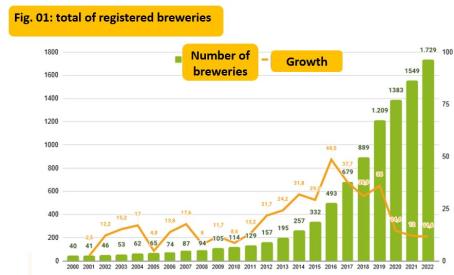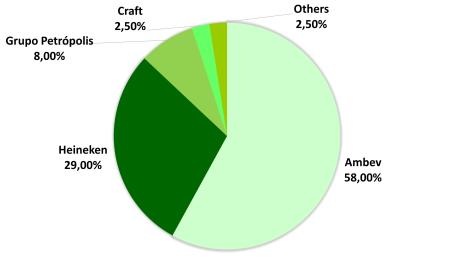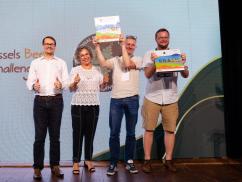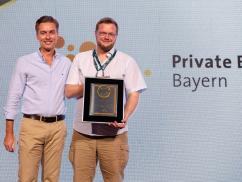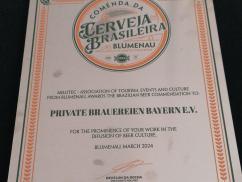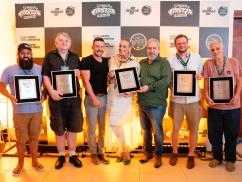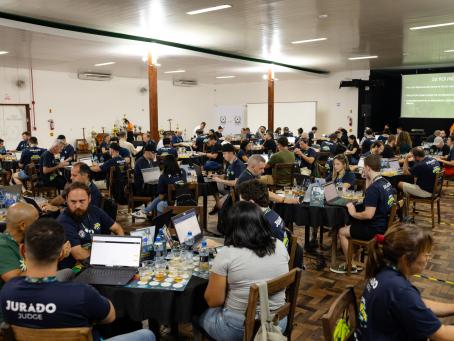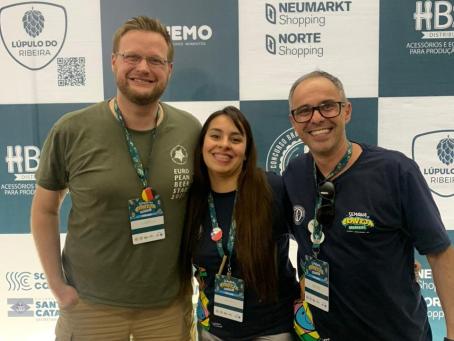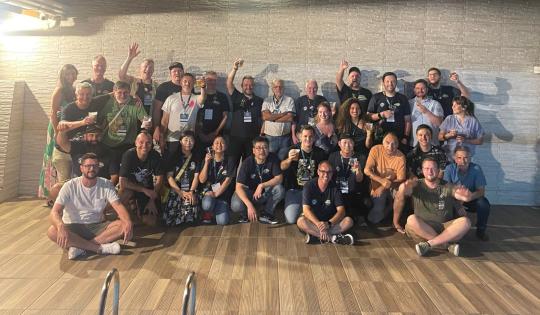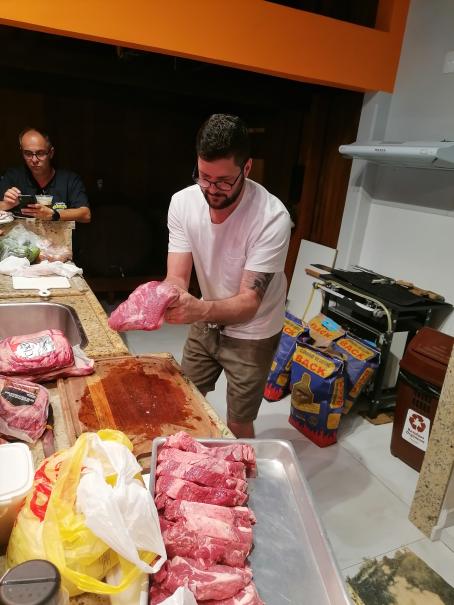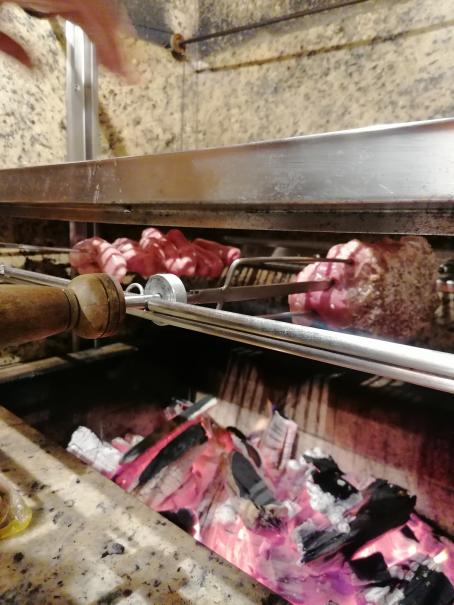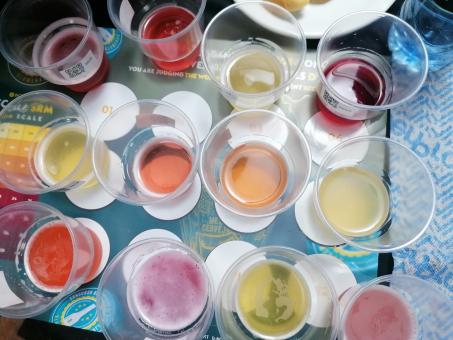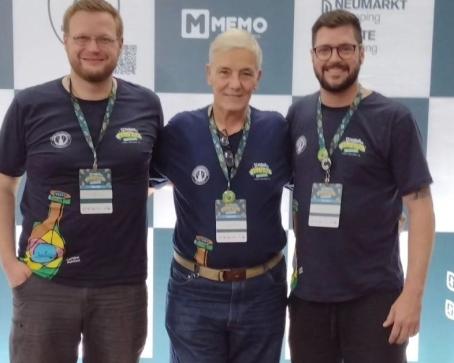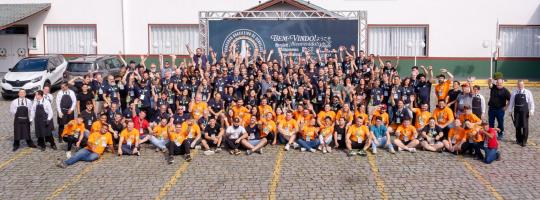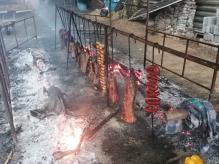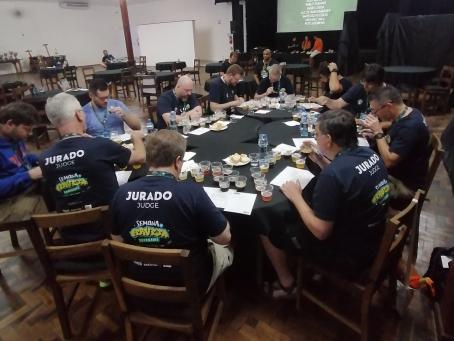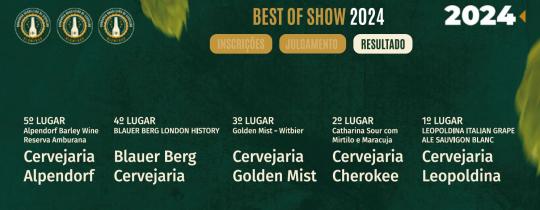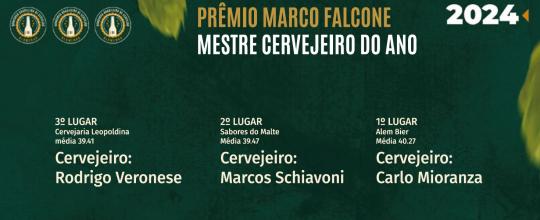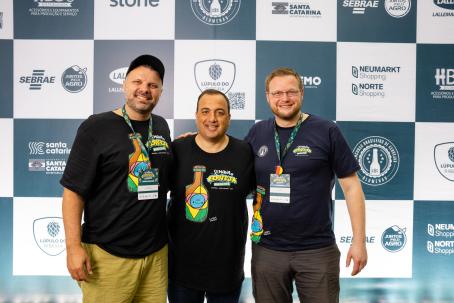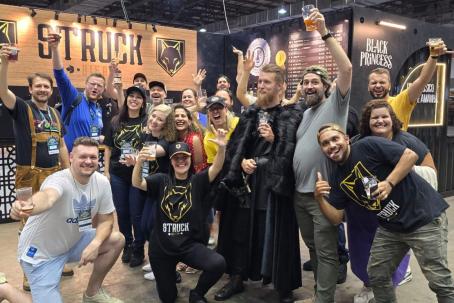More than Catharina Sour at Semana da Cerveja Brasileira
Brazil - football, caipirinhas and tanned bodies at the Copacabana. These are probably the first impressions most people have when they think of the largest country in South America. Very few people know about the diversity of beer in this country full of contrasts. After all, most beer enthusiasts are perhaps familiar with a Catharina Sour. But the country has so much more to offer! Especially when it comes to beer.
Brazilian's Beer Capital
It's not going too far out on a limb to describe Blumenau as the beer capital of Brazil. Blumenau is a major Brazilian city in the state of Santa Catarina, in the south of the country. The city was founded in 1850 by German immigrants. The city is known for its Oktoberfest - the second largest in the world. The German heritage is particularly recognisable in the architecture. Half-timbered houses modelled on Franconian architecture line the Rio Itajaí-Açu one after the other. But the German language has also been preserved in Blumenau. German often gets you further than English.
It is therefore not surprising that beer culture is also very important in Blumenau. One of the best-known Brazilian breweries is Eisenbahn, which won awards at the European Beer Star more than 10 years ago. But there are also new craft breweries such as Cervejaria Blumenau, which won bronze in the category Session Beer with its Grodziskie in 2022.
For most locals and tourists, the Oktoberfest Blumenau is certainly the highlight of the year, but for the Brazilian brewing community it is the Brazilian Beer Week - Semana da Cerveja Brasileira. There is something for everyone during this special week. A festival with live music and beers from all over Brazil, the Feira Brasileira da Cerveja (a trade fair that takes place every two years), a technical conference for professional input (CONIB) and the national tasting competition Concurso Brasileiro de Cervejas (CBC Blumenau).
CBC Blumenau and the market situation
The figures for the CBC Blumenau are impressive. In 2024, 4,147 beers from 567 breweries were submitted. And that's just from Brazil! If that's not an indication of diversity and a lively beer landscape in Brazil. A look at the statistics also proves this. Europan Beer Star Ambassador Rodolfo Rebelo gave a brief overview of the market situation in Brazil during BrauBeviale 2023. Because it's worth a look. Brazil is the third largest beer producer in the world. And although craft beers only account for 2.5% of beer sales, the number of breweries has risen rapidly over the past 20 years. Currently, as almost everywhere around the globe, a certain saturation seems to be setting in. Nevertheless, a lot has happened, which is also reflected in the tasting competition.
In hree tasting days, more than 100 tasters awarded medals to the breweries in over 130 categories. The following section is intended to give an impression of the tasting days.
Welcome Reception
Despite a late flight and a difficult journey, the Association Private Brauereien received a very special honour. The welcome evening is not just about chatting and socialising over good food and beer, but also about honouring special industry achievements. Fortunately, there was still time to get dressed and refreshed...
The international co-operation was celebrated together with the Brussels Beer Challenge. Ana Paula Lima, member of the Brazilian Chamber of Deputies, presented an illustrated book, published by the Department of Tourism. But the honour was not enough...
Ablutec, the organiser of the Concurso Brasileiro de Cervejas and the Semana da Cerveja Brasileira, honoured the association Privte Brauereien as the organiser of the European Beer Star for its work and efforts in the field of beer culture. The award was presented by Brazilian Tourist Board Southern Manager Luciano Boico.
A very special honour, we would like to thank Ablutec and are already looking forward to working together with the other award winners to promote beer diversity and enjoyment in the future.
All beginnings are difficult - the first tasting day
Well rested and full of motivation, the judges travelled by bus to the tasting location the following day. A special feature of this competition is the tasting via tablet. With such an immense number of samples, electronic support is almost indispensable. The tasting was carried out using the Beer Awards Platform (BAP), which was customised for the CBC Blumenau. The first hurdle with digital tastings is always to get the crowd of tablets into the Wi-Fi and the judges into the system. Fortunately, this was not a problem and the first round of tasting could begin quickly.
As usual, preliminary flights were evaluated on the first day of the tasting. In the very first session with International-Style Pilsner, a problem for Brazilian craft brewers became clear: oxidation. Several factors play a crucial role here.
- Climatic conditions: the temperatures are very high, especially in summer, with high humidity
- Transport routes: Brazil is a large country - the distances are simply long
- Type of transport and storage: there is a lack of awareness of beer as a product
- Technical equipment: many of the craft brewers are creative - this often also applies to bottling, the desired oxygen value in the bottled beer of < 0.1 mg/l is rarely achieved (author's assumption). The financial means for an expensive bottling plant are often not available.
The day continued with German-style Helles. After two very good samples, beers with diacetyl and phenolic off-flavours (staple plaster) were sorted out. We continued with Kölsch beers of good quality and interesting interpretations (dry hopped), followed by Schwarzbier, which were also convincing. With this style, there is a risk of the beers becoming too acidic due to the rather light body and roasted malt notes. The day was rounded off with Dunkel Doppelbock. Contrary to expectations, these were quite good, with fruity notes of ester, so that the first day of tasting could be summarised positively throughout. Special thanks go to my tasting table with Nathaly Rubio and Rodrigo Veronese, who we will hear from later in the text.
Attending international tastings is not just about the beers, of course, but also about meeting great people. And if I listed some buzz words for Brazil at the beginning of the article, then one thing was certainly missing: barbecue and steaks!
That's why this year the European Beer Star organised a barbecue evening for special friends of the competition together with steak master Rodolfo Rebelo. After a hard day of tasting, a caipirinha to balance the taste buds was a must. The Brazilian-style barbecue (eaten standing up with small portions of meat to snack on) was an unforgettable experience for everyone involved - thanks to Rodolfo!
And on we go - Day 2
The day started with an intermediate round of Schwarzbier. Not necessarily a common coffee substitute, but you take what you can get. A round of Altbier was followed by Contemporary-Style American Lager. A beer style with the description ‘low, little, barely present’ in terms of bitterness, hop aroma, sweetness, full-bodied, but must be free of off-flavours, highly carbonated and fresh. These beers are often brewed with malt surrogates such as maize or rice. An easy-going round, in other words.
This was perhaps necessary, as the table led by Gustavo Miranda and Rodolfo Rebelo (thanks for the great round!) was in for a bitter disappointment with the Gose flight. However, this had a certain learning character, as almost every possible off-flavour that can be found in beer could be found. Vinegar notes, followed by sticking plaster, DMS and flowery-floral impressions. Only one beer was sent to the next flight.
But fortunately it got better. Because the following session was Brett Beer with interesting combinations. The Brettanomyces flavours must definitely be recognisable, but it was also exciting to taste them paired with tomato and basil, in combination with wheat smoke beer (not a very successful combination) or stored in Amburana barrels. If you don't know what Amburana is, you can read Kraft Roku's blog post.
A small intermediate round with two samples was then really interesting. One was brewed with Cupuaçu (a type of cocoa), the other with Bacuri. These Amazonian fruits are probably so unknown that the brewery also sent a jam made from the respective fruits with the samples. A very nice idea, which gave the tasters some orientation.
The last round of the day was a real highlight. An intermediate flight of Catharina Sour.
Catharina Sour is a local beer style from Santa Catarina (hence the name). It is a sour beer that is similar in production to Berliner Weisse (Kettle Fruit Sour Beer). Catharina Sour is refreshing, with a low bitterness. The alcohol content is rather low. This makes Catharina Sour a perfect beer for the warm days in Santa Catarina. What makes the Catharina Sour so special is the use of local, exotic fruits, some of which are only found in Santa Catharina. As always, the balance between the sweetness and acidity of the fruit and the character of the beer is important.
The colour of the beers is determined by the fruit used. What a colourful variety at the tasting table! Beers flavoured with passion fruit, strawberry and dragonfruit were pitted against pineapple beers and mango-guava representatives. There was a lot to discover during this round. And also to learn. There were samples of cajá (the closest thing to a plum), mango and seriguela (red mombin plum) and jabuticaba (a type of cherry that grows on the trunk of a tree). With these beers, you really need the opinion of the local judges.
A sensational flight that was almost worth the journey on its own.
The many experiences of the day were then discussed in Oma's Haus Brewpub later in the evening.
Last Tasting Day with Best of Show
Things got serious the next day. The last tasting day is always about the finals and the medals. As if that wasn't motivation enough, there was a real speciality right at the start of the day. Wood & Barrel Aged Strong Beers. Although this is not the perfect tasting order (you normally start from low alcohol to higher alcohol content), it is sometimes due to the complicated organisation.
It should be fine with us, because the samples on the table were excellent. Two barrel-aged Barley Wines impressed the jury straight away, making it a relatively quick but intense round.
In the second flight, the final Leichtes Weizen awaited the team. Due to the low original wort content, you have to be careful with light wheat beers that they don't become too sour in character. Unfortunately, this was often the case with this final. However, the samples were all good and a winner was determined after a short discussion.
Unfortunately, the quality of the final beers in the category Dunkler Bock was not very high, so no gold medal was awarded. Once again, the high roastiness of the beers was striking.
The last round of the day was Italian Grape Ale. If you would like to know more about this beer style, you are welcome to take a look at the blog post on the Birra dell'Anno 2024. Local beer judge Eduardo Pelizzon and Italian Giorgio Marconi (a wine sommelier as well as a beer sommelier) were the absolute experts at the table. What is rather unknown in our part of the world is that there are some very good wine producers in Brazil who also try their hand at Italian Grape Ale. And quite successfully, as the quality of the final IGAs impressively demonstrated. Saison was often chosen as the base beer style. Gewürzaminer must, Moscato or Pinot Noir were then added. What was unusual, however, was that with all the excellent beers, every single judge immediately voted for the same beer. An outstanding sample, which, we can reveal, later became the Best of Show Beer.
Best of Show
While the majority of the judges were allowed to head off to the traditional barbecue directly at the tasting venue, a few had to keep on working. Someone's gotta do the job...
At the Best of Show tasting, the gold medal winners in each category are tasted again and the winner of the winners is chosen. The beers were categorised for this purpose. This allowed the Zuber/Kittl team to pre-select the German beer styles. At the end of the day, the winner of the South German-Style Weizen hell category was selected for the final table of the best 8 beers in the competition. Whereby ‘best 8’ is not entirely fair, as these tastings always involve subjective judgements by the tasters.
The last beers on the table included a Catharina Sour, the aforementioned Italian Grape Ale, American Dark Lager, American Strong Pale Ale, a Franconian Rotbier (!) and, last but not least, the Weizen beer we had selected. There was also a Witbier, Grodziskie, an Export Stout, an Old Ale which was a historically brewed British Imperial Stout and a Brazilian Wood-aged Beer. With all the different and excellent beers, it is clear that the decision was difficult and ultimately had to be made by voting.
The decision was made in favour of gold for the Italian Grape Ale, silver for Catharina Sour and bronze for the Wit.
Needless to say, all participants were very excited to see the results.
Award Ceremony and EBS Award Ceremony
After a short period of preparation by the organisers, the time had come and Brazil's best beers were awarded. And in front of a sold-out audience! The hall was packed with brewers from all over Brazil. Party atmosphere at its best!
As a very special highlight, the European Beer Star was able to present the Brazilian winners of EBS 2023 to the audience. Here is a short video to give you an idea of the atmosphere.
We would like to take this opportunity to congratulate the following winners once again:
- Cervejaria Bamberg: Silver in the category Schwarzbier
- Cervejaria Scarlett: Bronze for Scarlett Flanders in the category Wood&Barrel Aged Sour Beer
- Dona Lupulina: Silver in the category Grodziskie
- Berggren: Silver for Session IPA
- Brewine Leopoldinha: Silver for the Italian Grape Ale with Moscat
- The stout category was dominated by the Brazilian brewers with silver for Brotas Beer and the gold medal for Dama Beer.
Afterwards, 408 medals were awarded to the breweries. It was not uncommon for the passionate brewers to erupt in jubilation.
Parabéns to all the well-deserved winners of the Concurso Brasileiro de Cervejas 2024
Here's the list of all the winners!
Honorary Mention
We would particularly like to highlight the winner of the Best of Show tasting. European Beer Star taster Rodrigo Veronese and his team have managed to create an outstanding Italian Grape Ale with Sauvignon Blanc grapes. This beer has already impressed the tasters in the final of the IGA category and the judges in the Best of Show tasting were also very quick to agree that this beer deserved the prize. Congratulations on your masterpiece, dear Rodrigo! The other winners of the BOS tasting are shown in the following picture.
In addition, the brewmasters with the highest average number of points achieved in the competition were also honoured. They also deserve great praise for their quality work.
Thanks!
Special thanks for the invitation, the hospitality and professional organisation of the tasting, as well as the honours given to Private Brauereien, go to the tasting director Douglas Merlo and Develon da Rocha! The Brazilian craft beer scene was celebrated at the subsequent festival, not least thanks to their hard work. We look forward to seeing you again soon and wish the Brazilian Beer Week continuing success in the future and the Brazilian craft brewers the passion to continue brewing top-class beers!
Kilian Kittl



